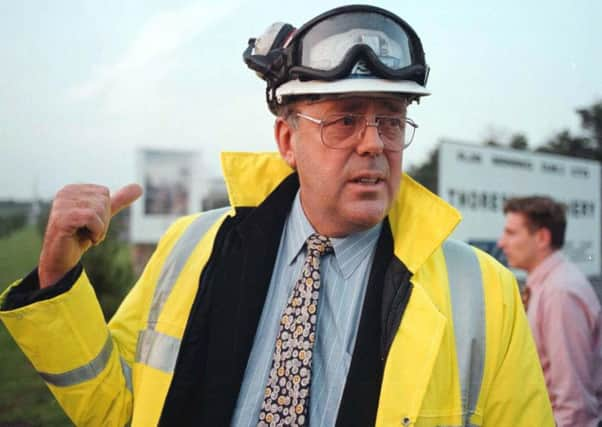Obituary: Richard Budge, entrepreneur


Richard Budge was the mining mogul who rose to prominence when he bought the bulk of the UK’s coal mines following the industry’s privatisation, and then battled to turn round the dying sector, earning him the moniker “King Coal”. At its peak, his company, RJB Mining, became one of the biggest independent coal producers in Europe.
In 1994 Budge gambled and bought 17 of Britain’s last 19 deep coal mines still in production, in the Conservative government’s controversial privatisation of the state-owned British Coal.
Advertisement
Hide AdAdvertisement
Hide AdThere was the bitter legacy of the year-long miners’ strike (1983-84), rigid work practices and growing imports to contend with, plus his own lack of experience but he remarked, “It would be a bit like the corner shop taking over Marks & Spencer.”
His Doncaster-based company, RJB, paid £815m for a package that included the 17 deep mines, 30 surface mines, more than 400m tonnes of reserves and nearly 50,000 acres of land, plus 10,000 employees. Despite an increasing policy preference for the so called “dash for gas” with gas-fired electricity generation over coal, both on cost and environmental grounds, the ebullient Budge was bullish.
He secured three-year deals to supply power stations across the Midlands and north of England and invested in new equipment in addition to exploring new projects. Profits jumped from £20m in 1994 to £186m two years later, and he began to pay down much of RJB’s bank debt. However, in the late 90s the price of coal fell sharply and with high fixed costs, RJB found it hard to adapt. Budge’s pleas to Tony Blair’s Labour government for subsidies fell on deaf ears.
As luck had it, conditions began to improve again as natural gas prices rose and coal burn in power stations rose, but boardroom disagreements over his plans for further expansion and his reluctance to prioritise shareholders over staff, led to his departure as chief executive of RJB in March 2001, and the company, renamed UK Coal, went into decline.
Born in Boston in 1947, the year the coal industry with 1000-plus deep mines was nationalised, Richard Budge attended the local grammar school, where he excelled in the unusual mix of maths, geometry and art, before going to Manchester University to study fine art. He soon dropped out however to start work at his brother’s company, AF Budge, a civil engineering company which built motorway junctions and did some surface mining. Richard claimed to find road building “as creative as art”.
Starting at the bottom, shifting cement, Budge learned the business, seeking advice when needed, and was soon elevated to management. At 21, he was promoted to supervise a million-pound contract to build five miles of the A19 in South Shields, and in his soft Lincolnshire burr proudly reminded fellow passengers in his car of his role whenever he drove along it. In 1974, the brothers diversified into opencast mining, an efficient use of roadbuilding machinery in winter, and won contracts from the NCB in County Durham and elsewhere. By the early 1990s this had become by far the most successful part of the business and the one that Budge concentrated on.
In 1992, with backing from venture capitalists, Budge bought-out the opencast coal and plant division from the family for £103m, rebranding it RJB Mining. Soon after, he bought two small mines and floated RJB on the stock market in May 1993. Months later AF Rudge went bankrupt with huge debts prompting a DTI investigation but Budge was cleared of any wrongdoing.
Following his dethroning from RJB, in 2001 Budge acquired the Hatfield Colliery near Doncaster, South Yorkshire (having outbid the now defunct US energy giant Enron), with the aim of building the UK’s first clean coal power station nearby; however, after spending £110m on it, the new venture fell into administration in 2003.
Advertisement
Hide AdAdvertisement
Hide AdHe formed Powerfuel and re-opened the pit in 2007 with KRU, Russian’s second biggest coal producer, owning a controlling 51 per cent stake, and EU funding of £153m. He also had inventive but ambitious plans to build a £635m carbon capture and storage unit adjacent to the colliery but failed to raise the £30m needed to upgrade the mine itself, and with government backing away from the technology, no funding was forthcoming and the money ran out in 2010, with ING taking control of all assets later in the year. In 2013, Budge was declared bankrupt.
Tony Lodge, of the Centre for Policy Studies, who worked on energy policy with Budge, said that “Richard had a vision but on clean coal he was probably 20 years ahead of his time”.
Despite these setbacks, Budge was recognised as having done more than anyone to try to sustain a viable UK coal industry. In 2015, UK Coal’s last deep mine, Kellingley Colliery at Beal in North Yorkshire, closed.
Budge supported mining charities and sponsored the Grimethorpe Colliery band even after the pit closed.
He was president of the Coal Trade Benevolent Association, chairman of the Coal Industry Social Welfare organisation and a trustee of the National Coal Mining Museum at Wakefield.
With a penchant for fast cars, in his free-time, he took-up motor racing, which he saw as a great business promotion tool. Budge went on to become one of Britain’s most successful amateur drivers, buying a string of 60s Chevron B8 classic racers and winning some major races, including the Thundersports 1983 Gold Cup at Oulton Park; another winner was Jackie Stewart. Budge once mused, “I was the first person on the cup whose name I didn’t know.”
For eight years he came first or second in his class until his family finally persuaded him to retire. Budge married, his teenage sweetheart, Rosalind White, in 1968 with whom they had two sons Kurt and Grant – both became entrepreneurs in the mining industry. He battled prostate cancer for a few years and is survived by his family.